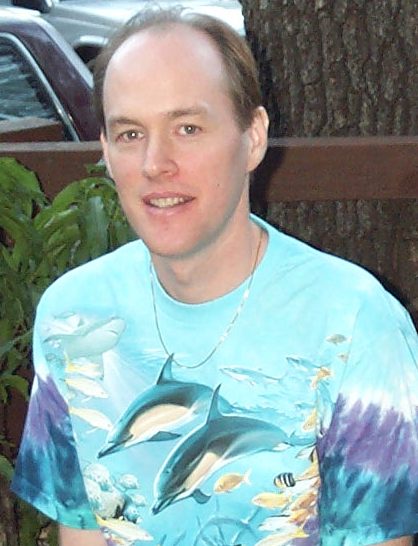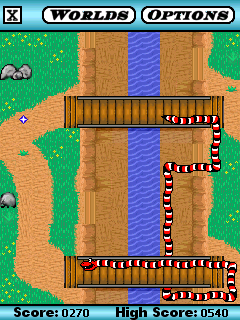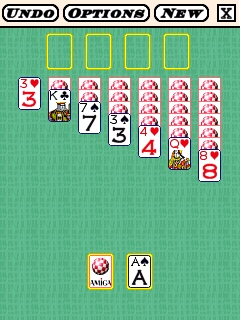INTERVIEW OF JOHN HARRIS
John Harris, an AmigaDE developer, who has created Gobbler and Solitaire on AmigaDE, answers to our questions... This interview was done by Boing Attitude :) on July 2002 and was published in french fanzine Boing Attack during September 2002
Boing Attitude : Hello John, Could you introduce yourself to our readers?
John Harris: I've been writing computer games since 1979, most notably some of the popular Atari 8-bit titles like Jawbreaker and Frogger. I received quite a bit of publicity back then, being written about in books like "Hackers" and magazines like "People", "Forbes", and others. After some floating around the industry, I co-founded Pulsar Interactive in 1997. A company of four people, we have been writing software on Windows/Mac, game consoles, PalmOS and GameBoy. I originally got started with the AmigaDE in the downtime between projects at Pulsar, but since I liked the environment, and love the community, I'm hoping to stay with the DE for the foreseeable future.
about in books like "Hackers" and magazines like "People", "Forbes", and others. After some floating around the industry, I co-founded Pulsar Interactive in 1997. A company of four people, we have been writing software on Windows/Mac, game consoles, PalmOS and GameBoy. I originally got started with the AmigaDE in the downtime between projects at Pulsar, but since I liked the environment, and love the community, I'm hoping to stay with the DE for the foreseeable future.
Boing Attitude : When did you "meet" the Amiga?
John Harris: I looked at the Amiga 1000 when it first came out. Having already programmed on the Atari 2600 and Atari 8-bit computers, (I'm a big fan of Jay Miner's work), I was eager to see the next incarnation. Unfortunately, I was disappointed with the stability of OS 1.0, and since I was working on professional applications at the time, the A1000 was not suitable for what I needed and I wound up working with the Atari ST instead. That machine never captured my heart though, and I picked up an A1000 a few years later in the OS 1.3 era. I also bought an A3000 shortly thereafter, and still have both machines set up.
Boing Attitude : What personnality, in world of Amiga, do you admire?
John Harris: Although he is no longer with us, I will always think of Jay Miner when I think of Amiga. He was a master at creating very flexible designs that were not only fun to program, but had tremendous growth potential once programmers figured out more and more tricks. The difference between the first products and the latest products on Amiga, Atari 8-bit, and the 2600 were staggering. You would have needed to upgrade the hardware in your PC several times to get similar improvements by comparison.
In today's world, I'd have to say Fleecy has done the most to make me feel welcome in the Amiga family, and in general been very helpful and supportive. Although I have not met him yet, I am very much looking forward to doing so.
Boing Attitude : Could you give some words about Gobbler, one of your first games on AmigaDE? How many people have worked on it? How long was the development? In which language?
John Harris: Gobbler was my second AmigaDE product, written in C, and uses the Ami2D graphic library.  The main benefit I got from Ami2D was the ability to update graphic images by just changing a pointer. With Tao's standard pix library, the only legal means of updating graphics requires an extra blit into the pix image, which later needs to be blitted again to the screen.
The main benefit I got from Ami2D was the ability to update graphic images by just changing a pointer. With Tao's standard pix library, the only legal means of updating graphics requires an extra blit into the pix image, which later needs to be blitted again to the screen.
I was the only programmer on Gobbler, along with an artist friend, Frankie Powell. Development time is a bit difficult to rate due to having medical problems part way through. Brain surgery in fact, which was a pretty crazy experience! Also, there was quite a bit of work added after the initial shipping version that allows Gobbler to scale and adjust to different screen resolutions of various devices. Overall, it probably could have been a 2-3 month project if I had a clean schedule to do it with.
Boing Attitude : Have you created another games or applications for AmigaDE?
John Harris: Solitaire was the first game I wrote for the DE, which is a collection of 10 solitaire card games. It was also written in C, and used artwork by Frankie. I'm particularly happy with the user interface on this one, which allows a single click to move cards to the most likely destination. It also figures out drag destinations based on the general direction of movement, so that a quick flick towards the destination is all you need when moving to a specific place. When playing with a PDA stylus, these motions are really easy to do and it makes the game very enjoyable to play.
I've been told that you've released C_starter or VP_starter tools? Could you give us more details about it?
They are like a foundation for handling some of the basic tasks, to make building AmigaDE applications a bit easier. Especially for someone just getting started with the DE, it helps cut down on the initial learning curve to get something running early on. They provide routines to initialize the environment and open the application window, handle the event loop and timed processes, draw graphics and text, and play sound effects. A recent addition to the VP version that I'm very happy with is a new class to handle simple object motion.
Boing Attitude : Are you satisfied of your sales on AmigaDE? Do you think games offers like "game entertainment pack" will improve it?
John Harris: There haven't been many sales of AmigaDE products so far, but that's because the intended market (i.e. mobile devices with a native DE environment), doesn't exist yet. The "game packs" are a start, but still aren't the same thing as running applications in the native OS of the device. So I really don't foresee a significant improvement in sales until and unless major devices start shipping with intent/AmigaDE embedded. An exception would be getting the "game packs" into retail distribution channels such that users could buy our products on store shelves. I know they're trying to do this, and that could be a big boost in sales.
Boing Attitude : What are your next projects on AmigaDE?
John Harris: I'm just finishing a word search game that is turning out pretty well. This was my first product in VP, and I must say I really like it. I won't go back to C unless I need to target something outside the AmigaDE environment.
Boing Attitude : Do you forecast to create software that are not intended to PDA or phones?
John Harris: No, I don't think so. Software for mobile devices fits perfectly with my skill set. It's one of the few places where writing small and efficient code (which I love doing) still matters. User interfaces are also critical, which is the other area I specialize in. With the requirements and expectations of mobile software being much less than other platforms, individuals and small teams can be competitive with what larger companies can churn out.
Boing Attitude : What kind of relationship do you have with Amiga Inc ? Are you satisfied by their technical support?
John Harris: The relationship with Amiga has been super. They have been very supportive, very helpful, and genuinely caring people. Some issues took a bit longer than I'd like to get resolved, but I recognize that their resources are limited right now and overall I've been happy. I always felt that they listened, and that they were trying their best to help.
Boing Attitude : Some people think that Amiga Inc do nothing for AmigaOS/AmigaOne (Hyperion,Eyetech) and AmigaDE (Tao Group). What's your opinion?
John Harris: I don't really know their involvement with AmigaOS. For the DE, they are providing various libraries and enhancements to Tao's basic SDK. In some cases, this is providing easier access to Tao's functionality (such as my design goals for the 'starter' packages), and in other cases such as Ami3D and other libraries in development, they are providing new functionality.
For the DE, they are providing various libraries and enhancements to Tao's basic SDK. In some cases, this is providing easier access to Tao's functionality (such as my design goals for the 'starter' packages), and in other cases such as Ami3D and other libraries in development, they are providing new functionality.
And of course one of the main things they are providing (hopefully) is the marketing for our AmigaDE applications. Personally, I don't want to deal with how the applications get sold. I just want to write them. Having someone else do all the sales work, and still collecting a large share of the product revenue is the way to go.
Boing Attitude : What are advantages and drawbacks of AmigaDE SDK?
John Harris: The advantages are having binary portability without having to write in a specific language like Java. (And without the speed penalties). And it's a pretty clean and efficient OS foundation that is much nicer to deal with compared to a monstrosity like M$ WindowsCE. We also have a friendly development community that is sharing code, ideas, and problem solving because most of us realize that it is in everyone's best interest to help each other succeed, thus increasing the number and quality of DE products and thus all of our chances for success. In short, it is some of the most enjoyable development I've been involved with for some time, and that's why I'm still here.
The drawback is clearly market share right now. It has yet to be shown whether writing AmigaDE products will generate any sufficient revenue.
Boing Attitude : What do you think of AmigaOS market? AmigaDE market?
John Harris: The AmigaOS market is tiny, and I don't see that changing anytime soon. But the AmigaDE market could potentially be huge -- 100's of millions of units. It all depends upon whether they get the contracts with the hardware makers, and I'm not sure what it's going to take to make that happen.
Boing Attitude : We have a tradition : what is your degree of confidence in future of Amiga? (from 1 to 100)
John Harris: Ouch, that's a hard question to answer, and to be honest, it varies from time to time. Since I don't have a firm grasp of what is needed for them to be successful, and what obstacles stand in their way, any number I might throw out would just be a guess. And a guess very likely weighted by hope, since I truly do hope that they, (and as a result I), will be successful in this endeavor. The best way I can answer this is to point out the switch I made to using VP as opposed to C. I wrote the initial products in C partly because it was already familiar to me, but also because I knew I could port the code to other environments should the AmigaDE not be successful. VP code is not usable outside of the Tao/DE environment, so the decision to start coding this way is an indication that I felt the chances for success were good enough to outweigh the risks of being locked in.
Boing Attitude : Thank you for your answers!